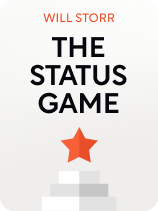

This article is an excerpt from the Shortform book guide to "The Status Game" by Will Storr. Shortform has the world's best summaries and analyses of books you should be reading.
Like this article? Sign up for a free trial here.
Do you want to increase your status? How can you play the status game safely?
The Status Game by Will Storr claims that it’s impossible to disengage from status games completely—despite the risks of playing them. But it is possible to protect yourself from the dangers of status games.
Let’s explore how to increase status without getting hurt.
Play Healthy Games—and Keep Your Priorities Straight
One way to increase status while avoiding the dangers of status games is to play the right games. According to Storr, we need to play success games (games of skills or knowledge), not virtue games or dominance games. He also recommends picking games with small group sizes, since these may be less competitive and more collaborative. Healthy games may also have shallow social hierarchies, without much inequality. For example, you might feel happier joining a supportive local running group than competing in a high-profile marathon that thousands of people enter every year.
(Shortform note: One way to select the right games might be to make sure you’re looking at them with the right perspective. In First Things First, Stephen Covey recommends adopting an “everybody-wins” mindset, rather than the “win-lose” mindset that society (and many status games) teach us to have. This means that rather than thinking of success as a zero-sum game, you could look for ways to collaborate and achieve success with other people. To do this, Covey recommends approaching problems with a group perspective in mind, listening to other people before offering your opinion, and then coming up with potential solutions together.)
Storr explains that it’s also wise to play multiple games to avoid having too much of your identity and status wrapped up in a single game. He recommends constructing a hierarchy of the games you play so you know where to invest your time and effort. For example, you might determine that your career is one of the most important games you play, but realize that being an active and valued member of a community—whether it’s your neighborhood association, a writers’ group, or your local LGBTQ community—is just as important to you.
(Shortform note: When you’re deciding which games to dedicate your time to, consider your priorities. In Designing Your Life, Bill Burnett and Dave Evans write that there are many paths you can pursue, but the one that will make you the happiest is the one where your priorities and your behavior are in alignment. They recommend finding ways to integrate your priorities for your work, and for other areas of your life, looking for a variety of activities that make you feel good and tracking what motivates you. Together, these strategies can help you figure out which pursuits—and which status games—make you feel engaged and happy.)
Storr also advises against indulging the natural tendency to hate people who play different games than you. For example, this might look like taking a step back from judging people who belong to the opposing political party as ignorant, wrong, or evil. You can also recognize that the moral principles you’ve accepted as part of the games you play are not universal. Even when you think that someone is doing something that’s morally wrong, Storr recommends cultivating empathy for them, trying to understand their perspective, and recognizing that they’re also playing a game and making tradeoffs to play it.
(Shortform note: It’s difficult to be open to the possibility that your moral intuitions could be wrong, or might not apply to everyone, as Storr recommends. But in Principles: Life and Work, Ray Dalio offers some advice that might help: He writes that if you think something is morally wrong, then you should first assume that your assessment is incorrect and figure out why what’s happening makes sense. To do this, you can practice radical open-mindedness, a process that involves looking for the best possible answer, acknowledging that you have biases, accepting that someone else might have the right answer, and trying to achieve both humility and self-knowledge about your thought processes.)
Focus on Making a Positive Impression
Next, when you’re looking to gain status, it can also help to pay attention to how you’re going about trying to get people to respect you. Storr recommends that rather than seizing status by force, you can make it more likely that other people will award you status by communicating in ways that make a positive impression, using the qualities of warmth, sincerity, and competence.
Other ways to make a positive impression involve demonstrating your respect for other people and their competence and agency (rather than indulging the tendency to compete with them or dominate them) and choosing to be a nonconformist. Being original can offer a healthier path to success than trying to be perfect. For example, you might start your own business rather than playing by the rules of an established corporation to gain status in your career.
(Shortform note: Other experts agree with Storr that focusing on how you communicate and how you treat other people can help you gain status in a healthy way. To make a positive impression on people, and to gain influence naturally, you might focus on building strong relationships with your family, friends, and coworkers. In High Performance Habits, Brendon Burchard recommends generating influence in three ways: by asking for what you want or need in your relationships, being generous with the people around you, and elevating the people you interact with by showing them your appreciation and gratitude.)
Remind Yourself That You’re Playing a Game
Finally, Storr notes that you can avoid many of the dangers of status games by simply remembering that it’s all a game: You’re not really a hero in a story, but are actually a player in a game. Storr writes that by staying aware of the games you’re playing and the rules you’re playing by, you can remind yourself to make more rational choices about what stories you accept and how you want to live your life.
(Shortform note: Another framework for thinking about your life as a game—in a healthy way—comes from Simon Sinek’s The Infinite Game. Sinek is specifically writing about business, but there might be broader value in his key insight that it’s more productive to think of what you’re doing as an infinite game (one that’s constantly evolving and never-ending) versus a finite game (one with a clear finish line). To develop what Sinek calls an “infinite mindset,” you can focus on just playing the game rather than trying to win, think of the impact that your actions have on other people, focus on building resilience, and emphasize your long-term goals rather than short-term priorities.)

———End of Preview———
Like what you just read? Read the rest of the world's best book summary and analysis of Will Storr's "The Status Game" at Shortform.
Here's what you'll find in our full The Status Game summary:
- How life is just a game of status and you're a player in it
- How the status game works and what you can do to avoid the toxicity
- What happens when the status games go wrong






